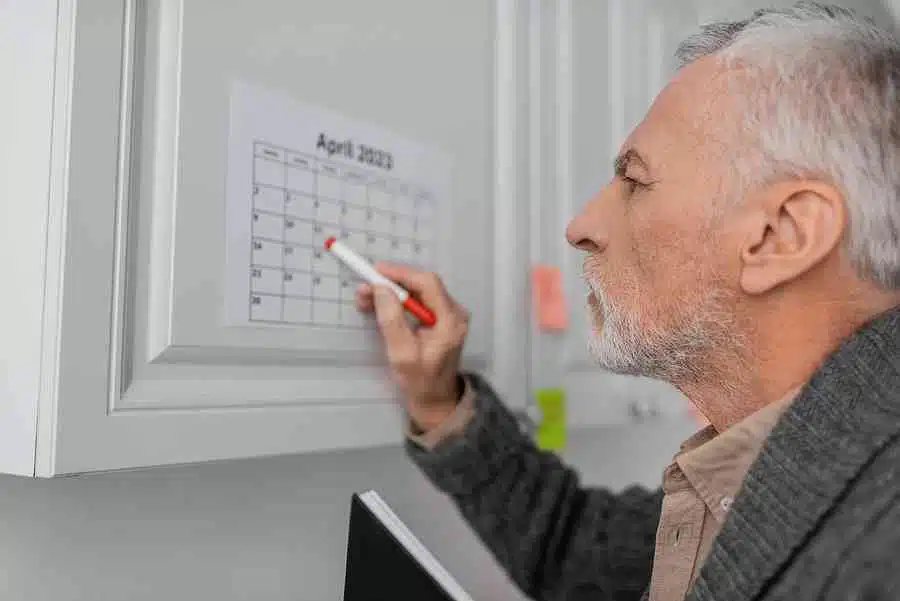How And Why Our Brain Declines With Aging

When it comes to aging of the brain, there are so many questions we can ask…
What do we mean by ageing?
When does it start and is it inevitable?
What are the features of ageing on the brain?
When does ageing become pathological?
Is there such a thing as healthy ageing?
All of these are really fascinating questions and I’ll be exploring them below.
Let’s Consider The Human Brain’s Appearance As We Age.
The shrinkage process starts to occur from about the age of 40. Its about 5% per decade until we reach the age of about 70, when it starts to accelerate even further.
All parts of the brain will shrink but some more than others.
We know that the grey matter, which houses the brain cells, shrinks .
Also, the white matter where all the ‘cabling’ occurs also shrinks. However certain parts of the brain shrink faster than others.
Primarily…
The frontal part of the brain, which deals with executive functioning.
The striatum, which is involved in the mechanism of movement, along with other functions.
The temporal regions of the brain, which incorporate our memory, for example, are all especially affected.
Some of the posterior parts of the brain, perhaps less so.
And as the brain begins to shrink, we increase the fluid spaces around the brain.

In terms of cognitive manifestations, how does that reveal itself?
We know that as people become older, the speed of thought decreases and memory impairment across all different domains becomes more of a feature.
Whether it’s related to events, related to language or tasks – the ability to reason, our executive function, and sensory awareness (particularly our hearing) become impaired as we become older.
There are lots of potential mechanisms involved in the ageing process
Every living thing needs energy to stay alive and function.
Inside our bodies, lots of tiny changes are always happening within our cells.
So we need to make enough energy and get rid of any waste left over from making it.
If we have trouble making energy, getting rid of waste, fixing broken things inside our cells, or growing new parts; then damage can start to build up inside our bodies.
Over time, this damage gets worse and it happens faster. Leading to bad effects on our bodies.
This is a big part of getting older, and it’s why people seem to get ‘older quicker’, the more they age.
The Brain Ages Alongside The Body
So when we think about ageing, particularly concerning the brain, it’s actually not just about the brain. It’s a multi-system process where lots of things are, in fact, going wrong….and going wrong exponentially.
Every species has innate characteristics that will predetermine effectively what its lifespan will be.
When we look at the human brain, there is also there’s an impairment of how synapses (the connections between cells) function as we age.
But it’s not just physical changes, we need to start thinking about functional changes too.
An interesting example is something called Hemispheric Asymmetry Reduction In Older Adults (Harold)
Where when we are young, specific tasks can really be quite localised to one particular part of the brain, ie to one particular hemisphere.
However, as we get older, it becomes more distributed across both hemispheres and different places.
And there are really interesting questions as to whether this is a maturation process or whether this is a compensatory process as things become dysfunctional.
When we think about the brain, we must think about damage, maintenance and compensation.
The Scaffolding Theory Of Aging
This brings us very neatly onto the scaffolding theory of ageing, which considers the entire life course of our existence.
So we are who we are in terms of how we are born, our genes, and our immediate environment in terms of nutrition, safety, education, cultural experiences; can all act as resources of neural enrichment.
Of course there are aspects as well which can be negative in terms of toxin exposures, head traumas, stresses and depression and so on which can act as neuronal resource depletion.
The brain is constantly changing both in terms of its structure and its function.
And through time the brain can actually work in various compensatory aspects to try and improve its situation.
So we are who we are in terms of how we are born but through our life course we can actually start to change the trajectory of what happens with our brain and how it’s structured really and how it functions by doing either positive or negative things to it.
So when do problems start or when do problems start to get noticed?
So problems really start from the get-go.
It’s just that we don’t necessarily notice it for the first 20 or 30 years of our lifespan.
Thats because at that point the brain and neuronal tissues are still in a state of generation and development.
However, there comes a point where things start to plateau and then things start to become depleted and things start to noticeable.
About the age of 40 we start to get brain shrinkage.
There were a variety of studies looking at combat casualties at Vietnam and beforehand in Korea.
Specifically looking at the arteries, the coronary arteries, ie the heart arteries of young soldiers killed in battle.
What they found was that even in young people, there are already the earliest signs and stages of coronary artery disease, already beginning to form.
Even though these are not things which will have manifested themselves until people have reached the age of 60; the seeds of degeneration are already actually planted many years beforehand.
Interestingly if we go back almost 200 years to the work of Gompertz – his formula which basically holds very much true to this day.
It effectively predicts that as we become older, our mortality rates become exponentially larger.
Although on the whole we are living longer, there is an inherent lifespan to a human being.
So what can we do to reduce the rate of brain aging?
It actually starts now.
Whether it’s doing cognitive exercises or social exercises, where we interact with other people; that can contribute to keeping our brains as young as possible
Stress management is also very important because depression is very bad for the brain – in terms of ageing and in terms of other things as well.
So while you may be in your 50s now, it’s never too late to start slowing down the ageing process.





